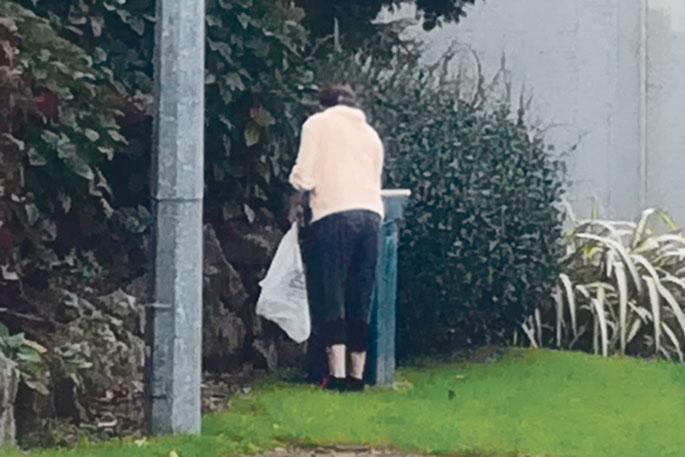'It's a rubbish bin, so I put rubbish in it. Your problem is ….?”
One very indignant punter – sneaking domestic rubbish into a big blue public rubbish bin.
'Well yes ma'am, it does look like a rubbish bin,” says The Weekend Sun reporter. 'And anything that looks like a rubbish bin with rubbish in it, I suppose, ostensibly, is a rubbish bin…but there's an important distinction.”
'No buts, no distinctions … I put rubbish, a few wine bottles, in a rubbish bin. I did not do anything wrong, I did not commit any offence.”
It was a right old stink over what constitutes rubbish, and when a rubbish bin is not a rubbish bin. A Weekend Sun reporter squaring off with a serial bylaw abuser in broad daylight on The Strand. Who was right? And why should we care?
'Well ma'am,” said the Sun reporter with all due deference. ”I am sure you, as a ratepayer, are familiar with the Tauranga Street Use and Public Places Bylaw 2013.”
Well, no she wasn't. 'No person, without prior written permission of Council shall deposit in or around a public litter receptacle any household, business or trade refuse.”
And for those unaware of the Tauranga Street Use and Public Places Bylaw 2013, the general thrust is reiterated in bold white font on the rubbish bins themselves. 'Unlawful to deposit household or commercial rubbish.”
Then The Weekend Sun put on its blue rubber gloves to perform an autopsy on the rubbish bin. There were several supermarket bags full of fruit and vegetable scraps, other household rubbish, several wine bottles, a wine bottle carton, magazines, a bag of dog excrement – stuff that does not constitute ‘litter'. A bylaw had been breached.
'And the problem is ….?” The answer, from Rebecca Maiden, Tauranga City Council's manager of resource recovery and waste, puts it in perspective.
'Our rubbish bins are there to keep streets tidy, as they enable the public to deposit small amounts of litter. They are not provided for household waste. When people fill up public bins with household waste, it can sometimes mean it's difficult to use the bins for their intended purpose.”
The bin abusers observed by The Weekend Sun were all middle-class, middle-aged women in middle-of- the-range cars – a paid-for rubbish bag wouldn't have seemed beyond them. And when they dodge the user-pays system, their behaviour becomes a cost to other ratepayers.
In 2016/17, 721 tonnes of rubbish was collected from public bins, whereas kerbside rubbish collection totalled 32,136 tonnes.
'If everyone used public bins for household waste, our collection costs would go up significantly,” says Rebecca. 'We've seen people disposing of household rubbish in public bins across Tauranga since 1994 when council moved to a user-pays kerbside rubbish collection system. At this stage, it's too early to say if the decision to stop kerbside glass collections has made a difference to waste collection from our public bins.”
There is no infringement option under the Street Use and Public Places Bylaw 2013.
'But we can issue fines of up to $500 under the Litter Act 1979, although in many cases it is difficult to track down the people responsible,” says Rebecca.
'Our staff follow up any leads about illegal dumping to identify offenders, and they may also speak to neighbours and the local community. We issue warning notices for first offences but we haven't yet seen any re-offending that warrants enforcement action.”



2 comments
Planks !
Posted on 19-05-2018 13:53 | By SonnyJim
Two of my neighbours put ALL their domestic rubbish in the local public bin too, and they are not homeless. No shame. Add to that the drive-up drop-ins and the barrel is soon overflowing. Council did circulate a 'neighbourhood flyer' some years back to no effect. Thanks for article, I'll get back to the Council.
Sign of the times
Posted on 19-05-2018 15:04 | By maildrop
Yeh, so many ignorant people. Scumbags.
Leave a Comment
You must be logged in to make a comment.